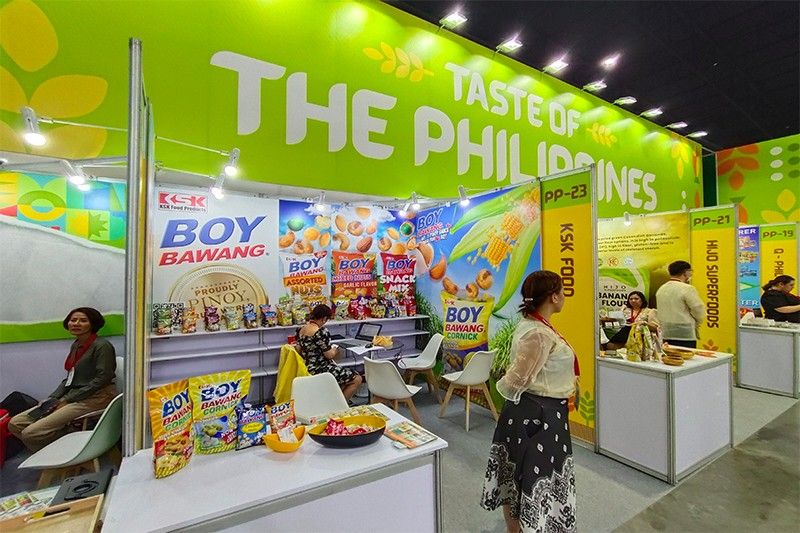Philippine food exporters push to reclaim their space in global market

NONTHABURI, Thailand — Intensified regional competition and similar products from neighbors are pushing Philippine exporters to bolster their position in the global market.
At the recently held THAIFEX Anuga Asia in Thailand, 25 Philippine-based exporters showcased a range of products, aiming to amplify visibility and forge partnerships that open doors to new distribution channels on a global scale.
Among the products exhibited by the Philippines were fruit products like dried mango, banana chips, coco sugars, and fruit powders. While these products are also available from neighboring countries, the Philippines faces the challenge of distinguishing itself as a preferred option.
“The most important thing is that we get the buyers [who] look for similar products, and they can see that these products are also available in the Philippines,” Ruben See, president of Philippine Food Processors & Exporters Organization, Inc (Philfoodex Inc.) told Philstar.com.
Keeping up with the competitors
The Philippines is experiencing heightened competition from its ASEAN neighbors and other countries offering similar products.
Earlier this year, it was reported that the Philippines lost its position as the world’s second-largest exporter of bananas, ending a six-year reign. This shift in banana exports highlights a broader trend affecting Filipino exports.
See, in an interview, emphasized the Philippines' history of innovation in food product development and its strength in export products. However, these products have increasingly become available in other countries, often on a larger scale, posing difficulties for the Philippines in maintaining its competitive edge.
“We were once very famous for Nata de Coco, but it slowly faded away from us. Another example is Virgin Coconut Oil and Coco Sugar, which are innovations. But now, other countries are benefiting from them. It's a missed opportunity,” he shared.
Despite the Philippines' efforts, See said that the country struggles to keep up with competitors who multiply their efforts at a much faster rate.
He cited calamansi, a citrus hybrid predominantly cultivated in the Philippines, as an example. While calamansi is anticipated to be popular in many countries and presents an opportunity for the Philippines, competitors like Thailand and Vietnam have already began to capture a share of the market.
"They multiply so quickly and it happens fast. Our resources are limited, and they quickly double or triple theirs. That's why we need government support," See stressed.
"Our champion products are coconut and calamansi. The market for calamansi is substantial, but the problem with calamansi is the short supply. Without enough support, we will struggle," he added.
More support, collaborations needed
For export readiness, on the other hand, See assured that Philippines products are export-ready, and our manufacturers have the capacity for export.
At THAIFEX Anuga Asia, the largest F&B event in Asia, participating Philippine products have certifications and meet requirements such as USDA-organic and Japanese Organic standards, ensuring we stay competitive.
Before participating in the show, PhilfoodEx said it trains Filipino exporters and new processors until they meet certain quality standards acceptable in the international market.
Besides quality standards, exporters like Mama Sita believe that addressing certain aspects could strengthen the Philippines' position as an exporter.
One of the many things Clara Lapus, president of Mama Sita Foundation who was present at THAIFEX Anuga Asia, wishes for is better support for our farmers.
Lapus expressed a desire for increased resilience among farmers and for farming to be made a more appealing profession for younger generations. She highlighted that without assistance, farmers may struggle to overcome environmental challenges, potentially leading to Philippine exporters being delisted in other countries due to perceived unreliability.
Similarly, she hopes for the Philippine Ports Authority to prioritize safety and efficiency.
“That the Philippine Ports Authority would realize that their primary role is to make Philippine Ports as safe and efficient as the Port of Singapore Authority, not to deliver P25.91 B dividends to the Department of Finance from 2016-2022,” Lapus said in a five-point prayer she shared with Philstar.com.
“Likewise, we pray that the Bureau of Customs would impose a hefty amount for any misdeclaration instead of 'legally proving that an importer is bringing in contraband,'" she added.
Moreover, See of Philfoodex and Aprille Robles, the project director of the Philippine Pavilion at THAIFEX, believe that the Philippine government must really support its local manufacturers.
The Philippine exhibit at the international show was hosted by Philfoodex and was supported by the Department of Agriculture, the Department of Trade and Industry, the Philippine Food Exporters Confederation and the Philippine Food Export Development Council.
Prior to the international show, See and Robles said there have been collaborations with government offices and organizations to hold trainings and business-to-business matching activities to help Filipino manufacturers get onto the global stage.
“There really is a need for collaborative effort among the association, exporters and the government," See said.
“After all, the return on that investment is helping the farmers and fishermen. If we can sell their products in important shows like this, they buy from our local farmers and fishermen, and eventually create more jobs,” he concluded.
- Latest
- Trending





























